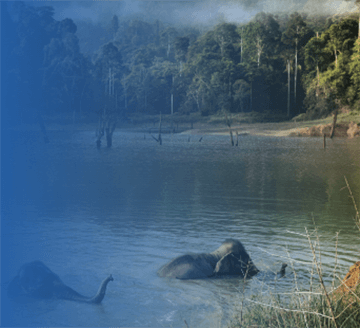TOWARDS MORE SUSTAINABLE INITIATIVES
Thanks to the scale and geographical spread of our operations, TNB faces inherent environmental challenges. Our long-term business sustainability depends on conservation and management of environmental risks, which in turn benefit the communities where we operate. TNB works with environmental and governmental organisations, such as the Department of Wildlife and National Parks Peninsular Malaysia (PERHILITAN), Forestry Department Peninsular Malaysia, Department of Fisheries Malaysia, Jabatan Kebajikan Orang Asli (JAKOA) and State parks to understand how we can better protect biodiversity hotspots and contribute to the wellbeing of our communities.
Our efforts in conserving biodiversity surrounding our operation sites:
- TNB conducted a study on threatened flora species (based on the International Union for Conservation of Nature's (IUCN) Red List of Threatened Species) found at the project site area.
- TNB has also developed a Wildlife Management Plan with consultation from Jabatan PERHILITAN that will outline implementation steps in monitoring and managing wildlife.
TNB conducted a study on threatened flora species based on the IUCN's Red List of Threatened Species found at the Temengor Dam.
- TNB conducts annual assessment on changes in aquatic life population.
- The findings from the annual assessment are important for us to understand and evaluate impacts from the station’s operation to surrounding aquatic habitat.
- TNB is running a Pilot Development of Habitat Rehabilitation and Restoration for Sediment Deposit Area in Cameron Highlands. This project is in collaboration with the Pahang State Forestry Department to rehabilitate and restore dredging disposal sites at Jor and Ringlet Lakes.
- The pilot development aims to identify suitable tree species and soil treatment required, as well as identification of routine practices that will enhance tree growth.
- TNB’s study to manage human-macaque conflict through Behavioral Ecology and DNA Metabarcoding has concluded in 2022.
- The results of the study has allowed TNB to understand the daily activity, behaviour and dietary requirements of the macaques which will be utilised to reduce human-macaque conflicts.
SITE & HABITAT PROTECTION
At TNB, we implement preventive and restorative measures to reduce our impact on local biodiversity, including minimising our operations within areas of high biodiversity value. However, there are several areas in which TNB conducts its activities and are home to an abundance of flora and fauna. Some species in these areas are protected under domestic and/or international declarations by public authorities.
Our current activities situated in areas of high biodiversity value has either commenced prior to the issuance of declarations of protections or after exhaustive analysis of alternatives and environment assessment with oversight from competent authorities where it was determined that there were no viable alternatives. The following table outlines the TNB facilities located within or adjacent to protected areas of high biodiversity value and our key ongoing initiatives on habitat protection and restoration:
- Fish Management & Eco-Tourism at Sungai Tiang, Royal Belum State Park
- Sediment Deposit Habitat Rehabilitation and Restoration at Jor Lake and Ringlet Lake - Jasik, Cameron Highlands
- Human-Monkey Conflict Management at Solar Farm: TNB Bukit Selambau LSS Plants Adjacent Areas
- Manage and mitigate impacts on wildlife population due to project development at Nenggiri Hydroelectric Project Site Area



